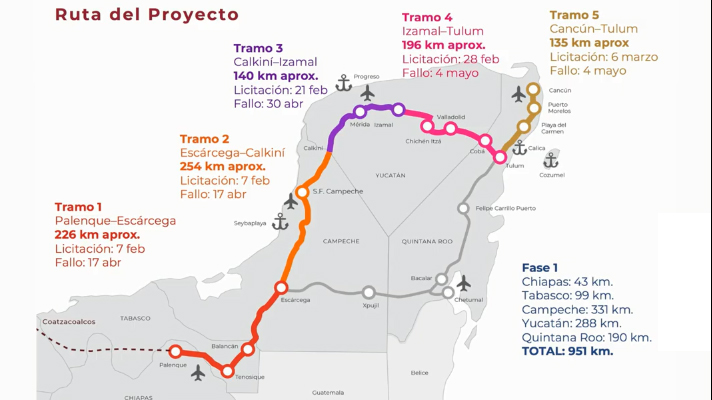Fonatur, the agency in charge of developing Mexico’s tourist industry, has named a shortlist of 15 consortiums that have bid to build the second section of the $6.7bn Maya rail line.
The project, which will connect tourist destinations and population centres on the Yucatán peninsula, is being billed by Mexican president Andrés Manuel López Obrador as the key to restarting the country’s economy after the coronavirus recession.
The second stretch of the 1,500km passenger and freight line will be a 235km section between Escárcega to Calkinà in Campeche state. Work is set to begin on 12 May, Fonatur announced on Tuesday. Four other sections will begin this year and two more next.
It also warned that this date may be put back if the health authorities decided that is necessary to mitigate the risk of coronavirus infection.
Fonatur said: “The winning company will be responsible for organising the project based on the basic engineering provided by Fonatur, the construction of platforms and rail lines, the supply of materials, roads and drainage systems, among other works.”
The lowest bid was received from a team of 11 Mexican companies, which also entered the lowest bid for the first section, the winner of which will be announced on 23 April.

The Mexican government’s map of the Mayan railway
The bids, in order of cheapness are as follows:
- A consortium of 11 Mexican companies led by Grupo Vázquez del Sur, based in Villahermosa in the southern state of Tabasco. This offered to build the line for $640m.
- A consortium of 11 Mexican companies led by Citcocomex Group. It bid $656m.
- Spanish civil engineer Copasa with four Mexican companies. It bid $728m.
- Spain’s FCC Construcción and Operadora Cicsa, both owned by Mexican billionaire Carlos Slim. It bid $740m. Â
- China Railway Construction Corporation with Constructora Y Edificadora Gia of Mexico City. It bid $740m. Â
- A team led by the Mexican arm of Portugal’s Mota Engil and China Communications Construction Company with three Mexican partners. It was one of four teams to bid $760m.
- PowerChina with MM-Mex and GH Maquinaria of Mexico. It bid $760m.
- Grupo Azvi of Spain and the Gami IngenierÃa subsidiary of Mexico’s Grupo Indi infrastructure company. It bid $760m.
- China Railway International with Consorcio De Ingenieros Constructores y Consultores and Grupo Industrial Rubio of Mexico. It bid $760m.
- Nexumrail of Durango and Emartrons of Guadalajara. It bid $780m
- China Gezhouba with 10 Mexican construction and engineering companies. It bid $810m.
- A consortium including Spanish contractor Dragado with Mexico’s La Peninsular CompañÃa Constructora and Camargo Correa Infra Construcoes. It bid $815m.
- Empresas ICA, the second largest construction group in Mexico, and Impulsora de Desarrollo Integral, an infrastructure specialist based in Mexico City. It bid $830m.
- A consortium made up of subsidiaries of Sacyr Construcción of Spain with three Mexican partners: Técnicos Especializados De Chiapas, Constructora Gordillo and Impulsora de Soluciones en Infraestructura. It bid $850m.
- CAABSA Constructora of Mexico City with four other Mexican partners. It bid $872m.
Tender for this section of the line were opened on 12 February; work is expected to be completed 2022. The tender period for the third section is still open.
Top image: Temple of the Masks in Kabah (Rob Young/CC BY-SA 3.0)
Further reading:










